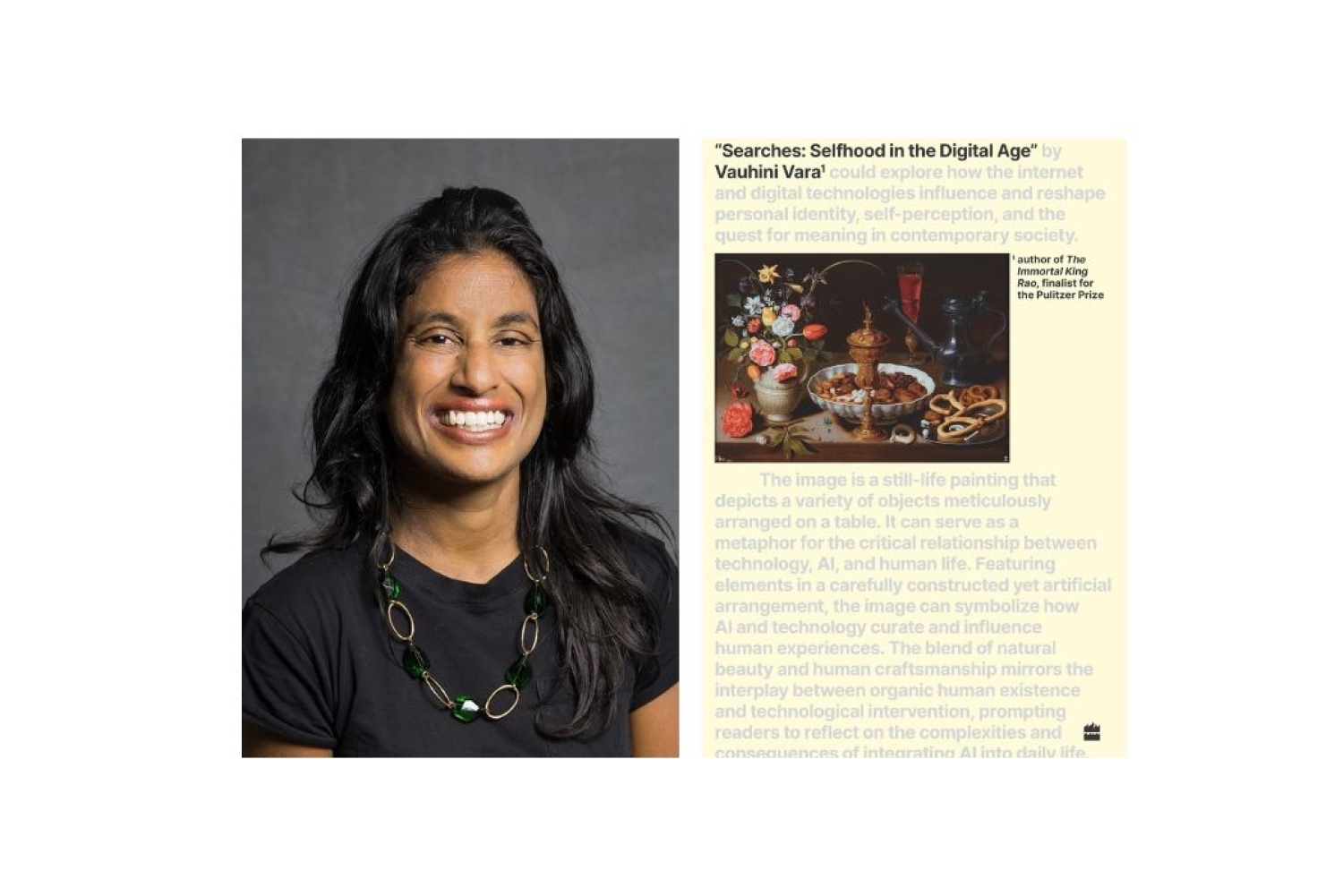

In Searches: Selfhood in the Digital Age, Vauhini Vara questions our relationship with technology and how it has seeped through our identity. The book ultimately boils down to our crisis on how to balance personal values and societal norms through ethical consumption. Vara traces the Internet through all of its forms, using memoir techniques and journalistic research methods to display her research and articulate her personal experiences. Our news channels are flooded with concerns regarding privacy, labour and the environment — all of which find their corners within the crevices of this book that is ultimately an ode to the collective creativity that makes human beings unique.
The paradox of technological capitalism is one we as a society are struggling to escape from — technology shapes and exploits human existence, simultaneously. What does that do to our understanding of the world, the people around us and the issues we face? In our interview, Vauhini emphasised the difficulty of articulating exactly how this book changed her relationship with technology — emotionally, ethically or practically.
What was most interesting is that throughout the book, she asks Chat GPT to assess her writing, challenging it with more pointed questions as the book progresses. She also interweaves data like her Amazon reviews and search history in a way that’s very effective. This story-within-a-story approach is one that resonates quite well, and also serves as one that drives home the very crux of the book, the battles of how AI is taking over our lives.
The thing about Vara is that she very clearly positions herself as one thing: she is not a technophobe. She does not disrespect AI, and that is precisely what makes her writing richer, since it is an acknowledgement of how tricky our internal dilemmas are. Instead, she calls us to interrogate our relationship with the online world and artificial writing, and make of that what we will. How do we build our lives? What goes into them? What meaning do our lives carry? And she tells us so artfully: of course, it must go beyond simply talking to a machine. We speak to her as she delves into her writing processes, inspirations and conflicts through the creation of this book.
Where did the idea for this book come from? Take us right back to the beginning.
In 2019, after realizing that Google had been collecting and storing all the searches I’d done, off and on, since 2005, I decided to try to reconfigure a subset of my searches, over a decade-long period, into an essay. The idea was to see if I could turn the language of my interactions with Google — a form that isn’t considered literary — into a literary form that would have multiple layers of meaning: I’d be giving readers a window into some of the most intimate aspects of my life, and at the same time, I’d be pointing out just how much Google knows about me — and, by extension, about all of us. After I published that essay, I became interested in trying a similar approach to analyzing the language I — and we — use with all kinds of corporate tech products, including Amazon, ChatGPT, and so on. The book grew from there.
Through this book, you’ve dabbled in two forms so seemingly different from each other — memoir and a critical study of AI — how did you balance these hybrid forms?
I don’t think of the book as a critical study of AI combined with a memoir. I see it as a critical study of our relationship with big technology companies’ products — including AI — using both memoiristic and journalistic techniques. Because of this, deciding what to include felt natural: I wrote about myself to the extent that doing so felt relevant to the subject at hand, and I turned to journalism whenever this felt relevant to the subject at hand.
The admission that AI is capable of writing, cutting, human-like sentences is scary, yet important. What does this do to your identity as a writer?
I would take issue with the notion that AI can write human-like sentences. Because AI is a technology, I feel that, by definition, it can’t write human-like sentences. That said, I would also argue that AI can produce language that moves and interests human readers. So the question becomes: What is the difference between human-produced and AI-produced text? I would argue that the difference has to do with the relational quality between writer and reader — how a text is co-created by a writer and a reader every time it’s newly read. Because AI isn’t human, it isn’t in the business of relationships. That’s why I say that, by definition, its sentences can’t be seen to be human-like.
You think of technology as an extension of our consciousness. What drew you to that intersection between technology and community?
I don’t think of technology as an extension of our consciousness, though I do think that technology products — like all products — can influence and mediate our experience of consciousness.
What were some of your literary inspirations going into this book?
I was inspired by all the human-written text that can be found online, including that of those who might not normally be thought of as writers.
Given that this is different from your previous books, what is your relationship with fiction, and what is your relationship with memoirs?
I don’t consider myself a memoirist. I have a strong relationship with fiction, and I also have a strong relationship with journalism. I find it exciting to write in all kinds of modes available to me — what I most appreciate is language itself and all the ways it can be deployed.
Did working on this book change your relationship with technology, whether emotionally, ethically, or even practically? If so, how?
I’m sure it did, but it’s difficult to articulate how!
Words Neeraja Srinivasan
Date 21-7-2025